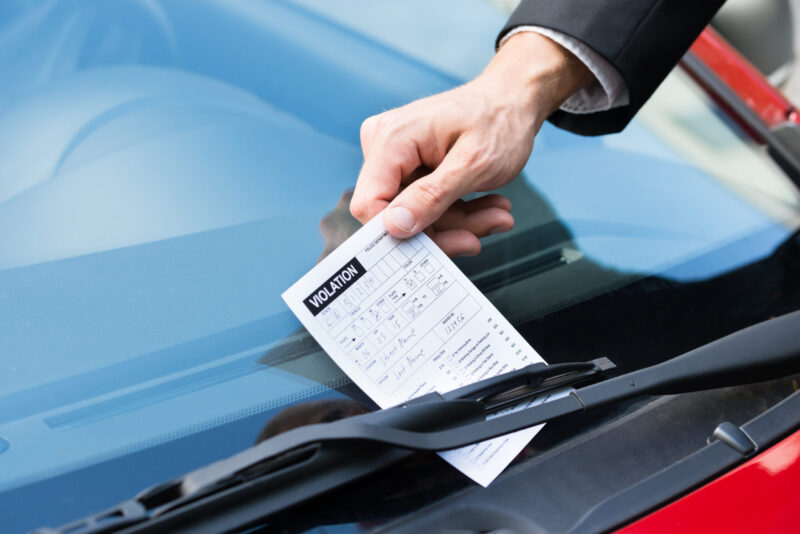From parking violations to not buckling your seat belt, receiving a traffic ticket is never fun. Not only can they be costly, but some can add points to your driving record as well.
Below, we’ll answer frequently asked questions about the DMV point system and provide tips to keep you and your loved ones safe on the road.
What Is the DMV Point System, Anyway?
The DMV point system is a way for the Department of Motor Vehicles to track drivers who have been involved in traffic violations.
If you are convicted of a moving violation, a set number of points will be added to your driving record. Get enough points and you could face a license suspension or revocation, in addition to fines or other consequences.
Most states use this system, but not all, and the states that do have varying guidelines.
What Violations Add Points?
Points are added to your license for moving violations. These are traffic violations committed by the driver while the vehicle is in motion. Although the number of points assigned for each moving violation differs from state to state, generally more points are assigned for more severe violations.
The most common moving violations that add points to your license include:
- Speeding
- Running a stop sign
- Running a red light
- Reckless driving
- Making an illegal turn
- Not buckling your seat belt
- Driving under the influence
- Driving a commercial vehicle without a valid commercial license
What Violations Don’t Add Points?
There are also traffic violations that will not add points to your license. Note that although these will not add points to your license, you can still receive tickets for them. These are non-moving violations, which usually include:
- Parking violations
- Paperwork violations (e.g., failing to renew your registration)
- Equipment violations (e.g., failing to replace a burnt-out headlight)
The best way to understand violations that will or won’t add points to your record is to understand how the DMV point system works in your state.
How Long Until My Points Expire?
Generally, the more severe the traffic offense, the longer the points will remain on your record.
In addition to having unique guidelines for the number of points assigned for each violation, states also have differing policies regarding the length of time points remain on your record.
In Connecticut, points will be removed from your driving record 24 months from the date they were assessed, for example.
Meanwhile, although just one state over, Rhode Island doesn’t use the point system at all. Instead, the state relies upon the sting of fines and the possibility of driver’s license suspensions or revocations to discourage drivers from challenging traffic laws.
What If I Accumulate Too Many Points?
As points or violations (if your state doesn’t use the point system) accumulate, your state may take a variety of actions, including:
- Fees and fines, which might be as high as several thousand dollars
- Warning letters
- Mandatory driving classes
- In-person hearings
- License suspensions
If your license is suspended, your driving privileges are taken away for a certain period of time. After, you are allowed to drive again without having to obtain a new license (although you may be required to pay a suspension termination fee).
However, if you are caught driving with a suspended license, your license can be fully revoked. This means that after a certain period of time, you will have to apply for a new license and pass the DMV exams before your driving privileges are reinstated.
Other scenarios that can result in license revocation include:
- Driving under the influence of drugs (including alcohol)
- Street racing or other forms of reckless driving
- Leaving the scene of an accident that resulted in an injury or fatality
Additionally, your license can be revoked if you are convicted of a non-driving offense, such as failing to answer a traffic summons, or a drug-related offense other than driving under the influence.
The accumulation of moving violations and points can have wide-ranging effects, from hefty fines to losing your driving privileges. Therefore, it’s in your best interest to keep your driving record as clean as possible.
Can I Do Anything to Decrease My Points?
Depending on your state, you can work towards removing points from your record. This can help you avoid a potential suspension, as well as the other problems that can arise if you are not allowed to drive.
Some states remove points from your driver’s license if you manage to keep a clean driving record for a specific period of time after receiving a ticket.
Another common way to have points deducted is to complete a driver safety course, which is allowed in many states. Your state’s DMV will strike a certain number of points from your record if you complete a course at an approved school. Keep in mind, though, that some states only allow drivers to deduct points this way a limited number of times within a given period.
Does My Driving Record Impact My Insurance Premium?
Insurance companies take your driving record into account when determining your premiums. Almost all insurance providers check their current customers’ driving records on a regular basis, as well as the records of those who apply for a new policy.
The general rule is that the more traffic violations you have, the higher your premiums will be. An exception to this is being ticketed for a non-moving violation, which rarely results in increased insurance costs.
If you are convicted of a major moving violation, such as driving under the influence or reckless driving, you will certainly see increased premiums. Insurers consider drivers with such violations to be high-risk drivers, who are more likely to be involved in a collision and file a claim than drivers with cleaner records.
Regulations regarding the period of time insurance providers are allowed to look back at customers’ driving records when calculating their premiums vary from one state to another, but it’s generally between three to five years (although it can be longer). This means that any ticket you received prior to that will not affect your insurance costs.
What Can I Do to Save Money and Stay Safe?
While some accidents are unavoidable, there are many ways you can practice safe driving or increase your skills (which may also help you save money!), including:
- Avoiding distracted driving
- Managing and navigating road rage
- Knowing the rules of the road
- Keeping your pets safe while driving
- Staying well to stay safe behind the wheel
- Taking a defensive driving class (A bonus: The Hartford offers discounts on auto insurance for driver training and education courses)
According to the latest data from Consumer Affairs, “it’s estimated that there were over 243 million licensed drivers in the U.S. in 2023, and about 89% of Americans ages 25 and older have a driver’s license.” It’s up to each and every one of us to do our part to make the roads as safe as possible.







Yes this was very helpful for me thanks for the information
I have taken on that driving is a team sport. Assisting other drivers is a win! my hierarchy is pedestrians first, then bikes, motorcycles, cars and trucks.
Leave room for others, help folks out. NO extra points for being first.
How do I find out my dmv points
I did not know that information, thank you for enlightening me.
I was rear-ended by an inattentive driver. Not my fault at all, no claim made on my policy. Does this affect my rates as it is noted as an “accident”?
It’s good to know what reasons one gets a ticket and what it can do to your driving record as well as your Car Insurance
Good to know info
How does having an accident affect my driving record and insurance?
does a claim on the insurance make the rate go up? and how much? weather related or accident or unprovoked, etc???
I would like to know why when I receive my first quote y’all quoted me one price then the next month I get quoted a total different price which was higher. I don’t understand why please inform me of why this change was made.
Hi Jacquelyn, that is definitely something The Hartford can help with. Please give our representatives a call at 888-546-9099 who can help you with your quote. Thank you for reading Extra Mile!
Slow down and let people go first, you will be surprised how much your stress goes down . Don’t blow the horn at nobody! The person in front will see the green light. Don’t blow the horn at someone trying to get into your lane! Let them in, slow down your going to fast, the horn doesn’t lie.
Very interesting, but would be helpful to know which states use that system or do not use it. I’m concerned when tv news reports mention repeat DWI violators involved in traffic accidents.
It was a great course on the points system and i enjoy reading and learning about it
I never knew about the point system. Thank you for the information. So far I have been safe on the roads.
Thank you, great article.
Is Texas under the point system?
My driving record is perfect.
I knew most of this, but read it anyway. I try to be safe with my driving for my health sake. Thanks for reminders and any new rules for senior drivers.